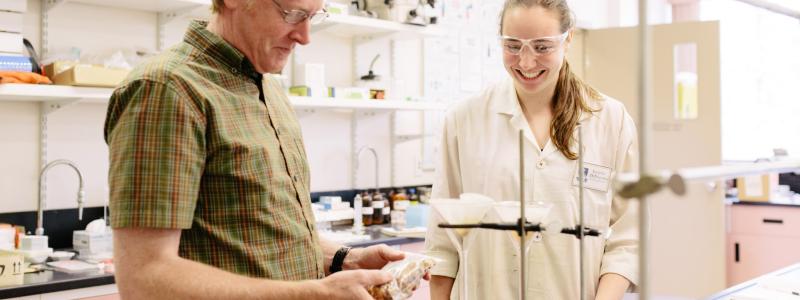It’s just a small berry. But TWU Professor of Chemistry, Biology, and Environmental Studies Paul Brown, Ph.D., hopes it will have a big socio-economic impact. Brown is working to identify the Central American soapberry’s properties with the goal to see how the berry—a readily available resource—might benefit the people of Honduras.
Brown first heard of the soapberry in 2011, when missionary friends John and Nancy McKeeth, who serve in Honduras, showed him the soapberry tree during a visit to the region. “They wanted to encourage the Honduran people to explore the resources they have and how to develop them,” Brown said. “The initial idea was to explore the use of these soapberries as a natural, eco-friendly laundry detergent.”
Earlier this spring, three Honduran scientists visited TWU to do research with Brown and student researcher and chemistry major Isabella Di Trocchio. Their objective is to develop research methods here that can be replicated in Honduras. Di Trocchio, a fourth-year student and member of the 2014 National Championship Spartans women’s soccer team, has appreciated the opportunity to be part of the research team. “I want to go to med school and research is a large component,” she said. “At TWU, I’ve had the opportunity to learn solid research techniques, as well as to work alongside the Honduran scientists on this project.”
Inspired by a researcher at Baylor University who had done similar work with coconuts, Brown began by surveying the soapberry trees—which are not a cultivated crop but grow wild in the region. Then, in collaboration with researchers from Universidad Nacional Autonoma de Honduras and Zamorano Pan-American Agricultural School, he began to examine and map out the surfactant profile of the different berries. “Grandmothers remembered their families doing their laundry with the soapberries,” Brown said of the berry known in Spanish as jaboncillo, or “little soap.”
About 40 per cent of by weight of each berry is soapy. Brown’s research centres around purifying out the soapy compounds to create specialty products suitable for people with chemical allergies, or those who prefer environmentally friendly products. “We don’t know where all this will lead,” Brown said, “but we hope that it will have applications that will be helpful for people."

